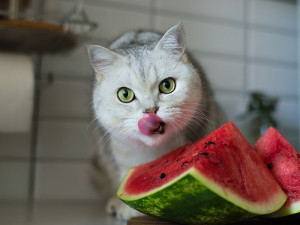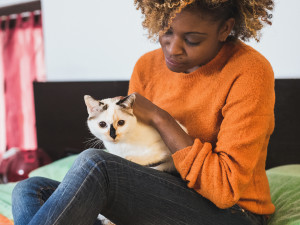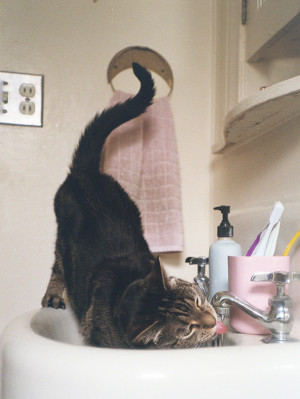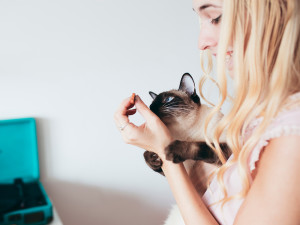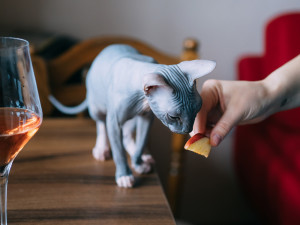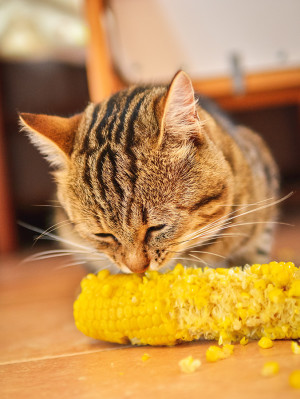Can Cats Snack on Blueberries?
Go ahead and serve up the superfood – with a couple of caveats
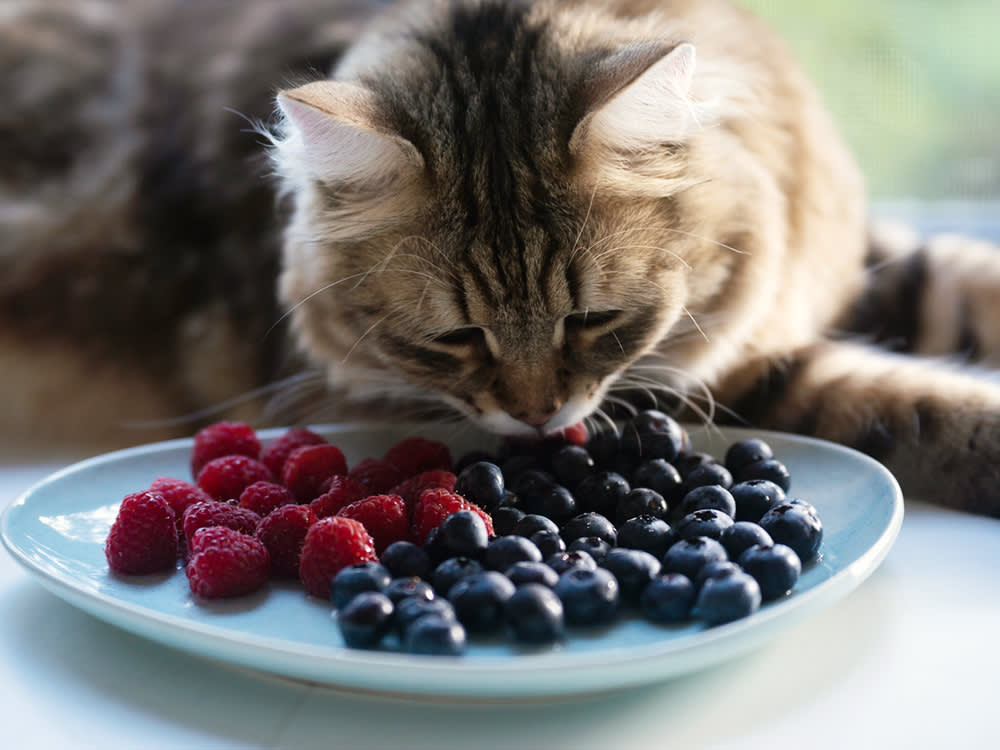
share article
The best snacks are the ones that satisfy your sugar craving and are actually good for you. Just like you power through a kale salad, your cat might begrudgingly eat their wet and dry food, but they probably suspect there’s something in it that’s healthy for them.
Not with blueberries. Your kitty probably gobbles those sweet little bursts of flavour up before they realise how many vitamins they’re ingesting.
For such small berries, blueberries pack a big nutritional punch. Blueberries are full of antioxidants, vitamin C, vitamin K, fibre and phytoflavinoids that have helped earn them their reputation as a superfood. Luckily for our kitties, they’re safe to share.
“There is nothing harmful about blueberries for cats,” says Dr Maryanne Murphy, clinical assistant professor of nutrition at the University of Tennessee. In fact, there are even some commercial cat foods and treats that list blueberries as ingredients.
Is it safe to feed my cats blueberries?
Blueberries are small enough to be offered to cats without cutting or processing – with two caveats:
1. Oversized blueberries should be cut into smaller pieces.
2. All blueberries should be cut or pureed before being offered to kittens; the berries could pose a choking hazard due to their small airways.
Similar to other fruits, blueberries are high in natural sugars; the same sweet flavour that makes blueberries popular with people (and dogs) might not be that interesting to cats. Cats lack the taste receptors to recognise sweet flavours, which means blueberries might not appeal to the feline flavour palate.
When are blueberries bad for cats?
It’s OK to feed your cat small quantities of blueberries, but Dr Murphy cautions that the fruits should be a treat, not a replacement for a complete and balanced diet – and treats, including blueberries, should never make up more than 10 percent of your cat’s diet.
Avoid processed foods, such as blueberry pie, blueberry scones, blueberry pancakes and blueberry jam that could contain extra ingredients that are toxic to cats. Any time you introduce a new food into your cat’s diet, watch for vomitingopens in a new tab, diarrhoeaopens in a new tab and other signs that the food may be causing a stomach upset.
How should I feed my cat blueberries?
Offering your cat a few fresh blueberries is always a good option. Just make sure to chop oversized ones into smaller pieces.
The bottom line: can cats eat human food?
When it comes to sharing your food with your cat, it’s always important to double-check that what you are offering is safe for your feline friend. There are some foods that are OK in moderation, but there are also some foods we eat all the time that are surprisingly toxicopens in a new tab to cats.
If in doubt, consult your vet before offering your cat something new. Always make sure that what you offer is free of spices and oils that could be problematic for your cat, even if the main ingredient is safe.
Be sure to avoid foods that may be a choking hazard or cause injuries to your cat’s digestive tract, such as foods with bones, shells, toothpicks or skewers. And finally, remember that cats have very unique nutritional requirements so they must get the bulk of their diet from a balanced cat food diet. The occasional scrap of human food may be a delicious treat, as long as it is less than 10 percent of your cat’s total diet. Most important of all, be sure to provide your kitty with appropriate, nutritionally balanced cat food.
Foods that are good for cats
If you are looking for healthy snack options to share with your cat, consider some of these:
Watermelon can be a refreshing treatopens in a new tab to share with your kitty.
Peanut butteropens in a new tab is high in protein and good fats.
Apples are a great source of fibreopens in a new tab and many important vitamins (although the seeds can be toxic ingested in large quantities).
Foods that are dangerous to cats
Garlic is toxic to cats and can cause life-threatening anaemia.
Onions are toxic to cats and can cause fatal health complications.
Chocolateopens in a new tab is toxic to cats and can cause a range of health problems depending on how much is ingested.
Note: while caution was taken to give safe recommendations and accurate instructions in this article, it is impossible to predict an individual cat’s reaction to any food or ingredient. Readers should consult their vets and use personal judgement when applying this information to their own cats’ diets.

Jodi Helmer
Jodi Helmer is a North Carolina-based freelance writer who shares her home with an embarrassing number of rescue dogs and relies on four feral cats to patrol the barn. When she isn’t refilling food and water dishes, Jodi writes about animals for Scientific American, Sierra, WebMD, AKC Family Dog, Living the Country Life, and Out Here.
Related articles
![Tabby cat leaning into a porcelain sink, tail curled in the air, as it sticks its tongue out to drink water from the faucet.]() opens in a new tab
opens in a new tabWhy Is My Cat So Damn Thirsty?
No, not like that. They’re literally drinking a lot of water. Here’s when you should be worried
![A woman eating peanut butter toast with her cat laying on the table]() opens in a new tab
opens in a new tabCan Cats Eat Peanut Butter?
The sweet and salty treat is OK in moderation
![Blonde woman holding cat trying to feed it ham]() opens in a new tab
opens in a new tabCan Cats Eat Ham?
Ham is OK – with a couple of caveats
![A gray Sphynx cat sniffing an apple slice held out by her owner while standing on a table next to a glass of wine]() opens in a new tab
opens in a new tabCan Cats Eat Apples?
Yes, but the fruit might not hold much a-peel
- opens in a new tab
Can Cats Eat Popcorn?
They want to enjoy movie night, too, you know
![an orange and brown cat nibbles corn on the cob]() opens in a new tab
opens in a new tabCan Cats Eat Sweetcorn?
A few kernels won’t hurt, but think twice before doling out a bowl of the stuff
